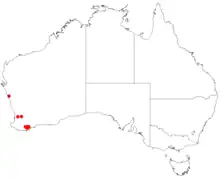| Leucopogon atherolepis | |
|---|---|
| Scientific classification | |
| Kingdom: | Plantae |
| Clade: | Tracheophytes |
| Clade: | Angiosperms |
| Clade: | Eudicots |
| Clade: | Asterids |
| Order: | Ericales |
| Family: | Ericaceae |
| Genus: | Leucopogon |
| Species: | L. atherolepis |
| Binomial name | |
| Leucopogon atherolepis | |
 | |
| Occurrence data from AVH | |
| Synonyms[1] | |
Leucopogon atherolepis is a species of flowering plant in the family Ericaceae and is endemic to the south-west of Western Australia. It is an erect shrub with linear leaves and white, tube-shaped flowers.
Description
Leucopogon atherolepis is an erect shrub that typically grows to a height of 0.3–1 m (1 ft 0 in – 3 ft 3 in) and has long, straight stems and erect or spreading leaves with a sharply-pointed tip. The flowers are arranged near the ends of branches or in upper leaf axils, forming leafy panicles with bracts and bracteoles about 4 mm (0.16 in) long. The sepals are about 6.5 mm (0.26 in) long, the petals white and joined at the base forming a short tube with lobes nearly 6.5 mm (0.26 in) long. Flowering occurs from August to November.[2][3]
Taxonomy
Leucopogon atherolepis was first formally described in 1859 by Sergei Sergeyevich Sheglejev in the Bulletin de la Société impériale des naturalistes de Moscou.[4][5] The specific epithet (atherolepis) is derived from Greek words meaning "the point of a weapon" and "a scale", referring to the sharply-pointed bracts, bracteoles and sepals.[6]
Distribution and habitat
This leucopogon grows on rocky hillsides, mainly in the Stirling Range National Park in the Esperance Plains and Mallee bioregions of south-western Western Australia.[2]
Conservation status
Leucopogon atherolepis is listed as "not threatened" by the Government of Western Australia Department of Biodiversity, Conservation and Attractions.[2]
References
- 1 2 "Leucopogon atherolepis". Australian Plant Census. Retrieved 28 June 2022.
- 1 2 3 "Leucopogon atherolepis". FloraBase. Western Australian Government Department of Biodiversity, Conservation and Attractions.
- ↑ Bentham, George; von Mueller, Ferdinand (1868). Flora Australiensis. Vol. 4. London: Lovell Reeve & Co. p. 188. Retrieved 28 June 2022.
- ↑ "Leucopogon apiculatus". APNI. Retrieved 26 June 2022.
- ↑ Sheglejev, Sergei Sergeyevich (1859). "Epacridearum Novarum". Bulletin de la Société impériale des naturalistes de Moscou. 32 (1): 13–14. Retrieved 28 June 2022.
- ↑ Sharr, Francis Aubi; George, Alex (2019). Western Australian Plant Names and Their Meanings (3rd ed.). Kardinya, WA: Four Gables Press. p. 139. ISBN 9780958034180.